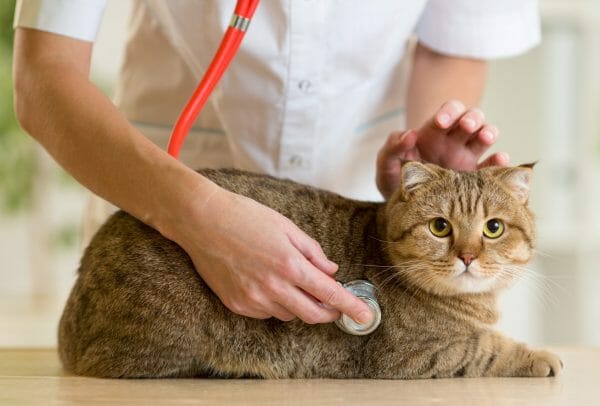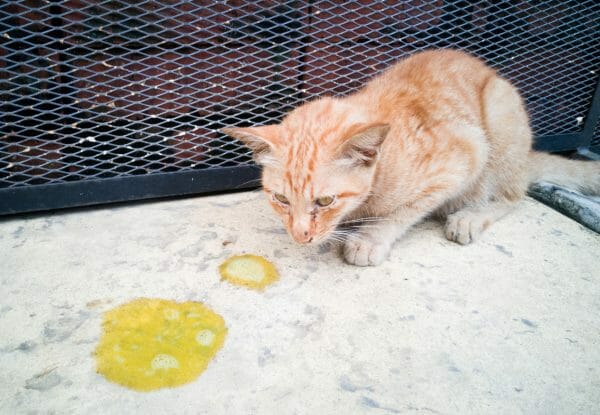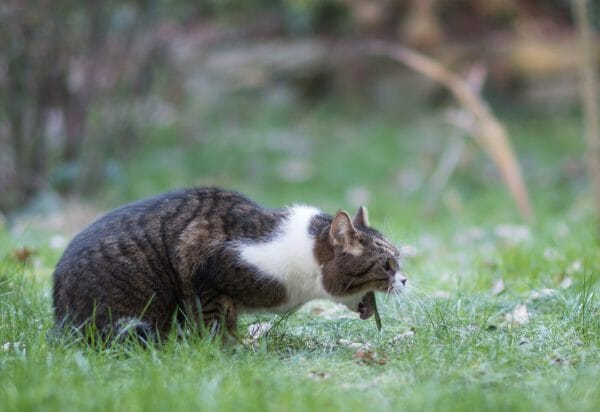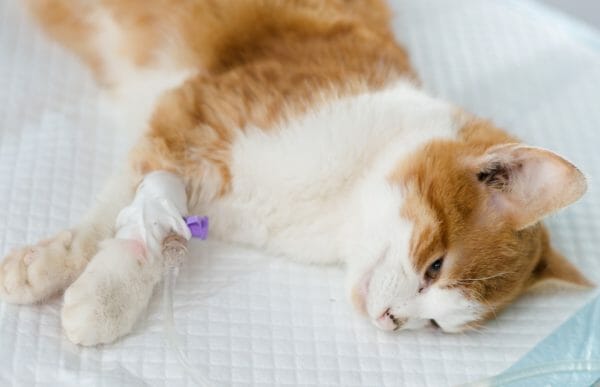Why Do Cats Vomit?
Cat vomiting involves the sudden evacuation of stomach contents. It can be caused by gastrointestinal problems or could be a clinical sign of many other feline diseases and health concerns. Many long-haired breeds will occasionally bring up furball cat vomit. This is quite normal and is the result of the grooming process.
Most cats vomit from time to time. Provided the vomiting occurs less than once a month, it is usually nothing to be concerned about, particularly if the cat is displaying no other symptoms. However, if a cat is vomiting more frequently, then it is advisable to consult a veterinarian. There are many types of cat vomit and understanding the differences can help determine the root cause.

What Causes Vomiting in Cats?
Causes of cat vomiting can vary as many illnesses bring it on. Specific causes of feline vomiting include the following categories.
- Diet: Food intolerances, eating infected prey, or changing to a new diet
- Drugs: Antibiotics, anti-inflammatories, or chemotherapy drugs
- Endocrine Issues: Diabetes ketoacidosis, elevated calcium levels, or hyperthyroidism
- Gastric Issues: Presence of foreign bodies, ulcers, or inflammation in the stomach
- Infections: Feline infectious peritonitis, feline panleukopenia, or heartworm
- Intestinal Issues: Acute inflammation of the intestinal tract, cancer, chronic inflammatory bowel disease, constipation, or the presence of foreign bodies
- Neurological Conditions: Encephalitis or vestibular disease
- Organ Dysfunction: Liver or kidney disease and pancreatitis
- Toxins: Ingesting antifreeze, toxic plants, or other toxins and poisons

Cat Vomiting Diagnosis
Diagnosing the cause of vomiting in cats can be difficult. When cases are acute, the vomiting will often be transient and will improve over time. A veterinarian will carry out a basic workup and will take a full history to ensure no serious conditions are present.
The veterinarian may ask:
- How long has the vomiting been occurring?
- Has the cat been exposed to toxins or potentially poisonous plants?
- What does the cat usually eat? Has the cat’s diet changed recently?
- Does the cat spend any time outdoors and does it hunt?
- What color is the vomit?
- Is the cat on medication?
- Does the cat have diarrhea?
- Has the cat lost weight?
- Is the cat eating as usual?
- When does vomiting occur in relation to the cat eating?
- How frequently is the cat drinking and urinating?
- Does the cat play with string or yarn?
These questions will help the veterinarian find a starting point in diagnosing the cause of the vomit.

The veterinarian may also carry out the following tests.
- Blood tests can provide evidence of an infection, thyroid disease, liver and kidney problems, or diabetes.
- X-rays can be used to identify abnormalities in the stomach or esophagus, as well as the presence of obstructions, ulcers, tumors, and foreign bodies.
- Ultrasounds provide a vet with a view of the intestines and stomach to identify any obstructions, inflammation, or tumors.
- Endoscopy. Using an endoscope, a veterinarian can view the inside of the cat’s stomach. This can also be used to obtain samples for biopsy.
- Laparotomy. If an obstruction is suspected or a biopsy is needed, an exploratory surgery can be performed to examine the cat’s internal organs.
Cat Vomit Color Chart
Clues can also be provided in the cat vomit color.
- Cat Vomiting Yellow Liquid. Yellow liquid indicates bile and often happens when the cat’s stomach is empty. It can be a sign of liver infection, or the cat may have eaten something yellow.
- Cat Clear Vomit. Vomit may be clear because the stomach is empty or may indicate that the regurgitation is from the cat’s esophagus.
- White Foamy Cat Vomit. Can be caused by an empty stomach or esophagus regurgitation.
- Cat Vomiting Blood. The blood could be from the esophagus, mouth, or stomach. Vomiting blood is always a reason to visit a veterinarian.
- Cat Vomit Coffee Grounds. Cat vomit that looks like coffee grounds is usually an indicator of ulcers and is caused by bleeding in the stomach.
- Brown Cat Vomit. Vomit that is brown could either be caused by bleeding in the cat’s upper gastrointestinal tract or by eating something that is brown.
- Cat Vomiting Undigested Food. When this occurs, the food has never left the cat’s stomach. This could be caused by an allergy, food intolerance, upper gastrointestinal tract irritation, or an obstruction. Knowing when and what the cat last ate can to identify the specific cause.

Cat Vomiting Treatment
The specific treatment will vary depending on the cause of the vomiting. When the physical examination does not identify any abnormalities, the veterinarian may elect to administer fluids subcutaneously. Providing fluids can flush out the cat’s system and improve hydration levels. A cat that is vomiting frequently is likely to be dehydrated due to a loss of fluids and the inability to hold anything down.
Unfortunately, dehydration can be self-perpetuating. This means that when the cat is dehydrated, it will feel ill and will not consume food or water, which leads to additional vomiting and increased dehydration. In cases where the animal is particularly weak, IV fluids may be administered. A catheter will be placed in the cat’s vein to provide fluid directly. This treatment usually requires a feline to stay in the hospital and may be costly.

Antiemetic (anti-vomiting) medications may be provided to prevent further sickness and minimize fluid loss. This type of medication can also help reduce abdominal pain and discomfort, which will make the cat more likely to eat.
In cases of chronic and acute vomiting in cats, a diet change can be beneficial. Temporarily moving to a diet that is easier to digest can increase the chances of the cat keeping food down. Allergies, food intolerances, and inflammatory bowel diseases can all be helped with a change in diet. It may be beneficial to maintain the new regime for a prolonged period, even after vomiting ceases.
Prednisone is a medication used for treating inflammatory bowel disease (IBD). This should only be administered if the veterinarian is certain the cause is IBD as the medication can have side effects and cause further vomiting in cases involving kidney disease, diabetes, or pancreatitis.



